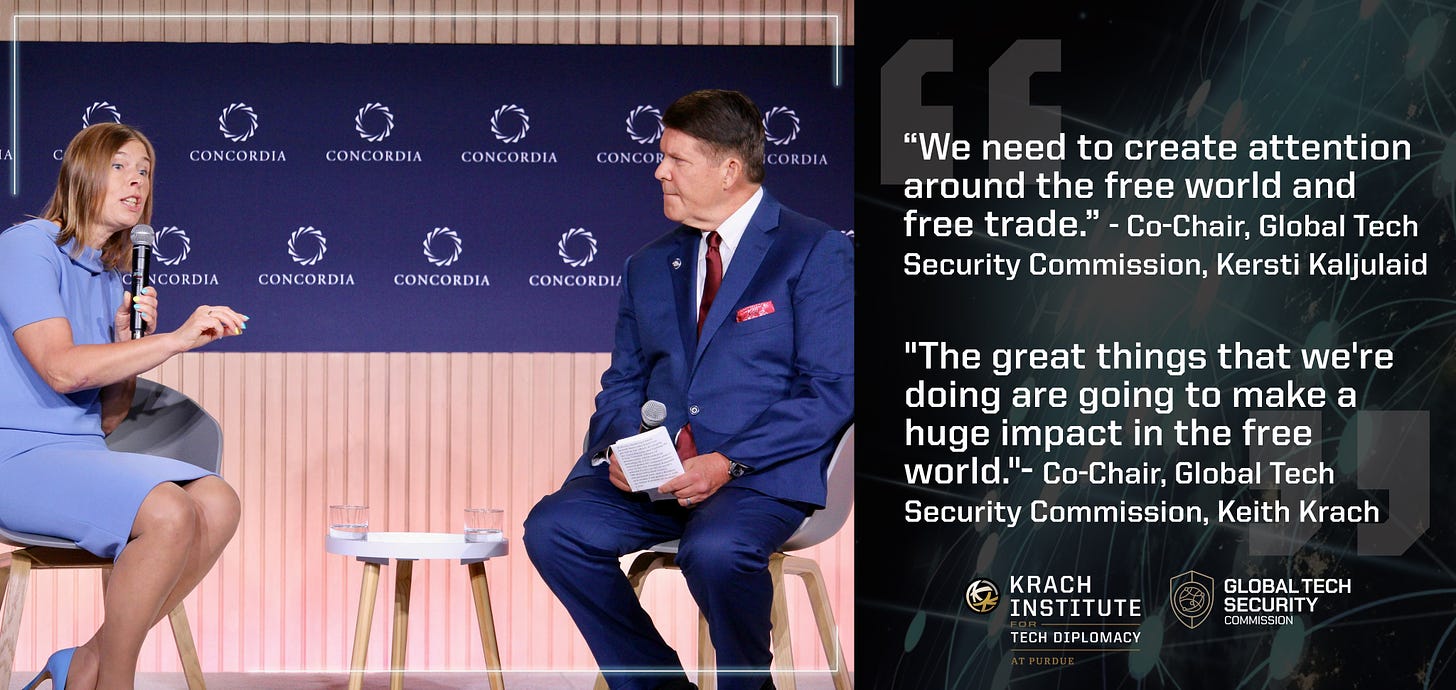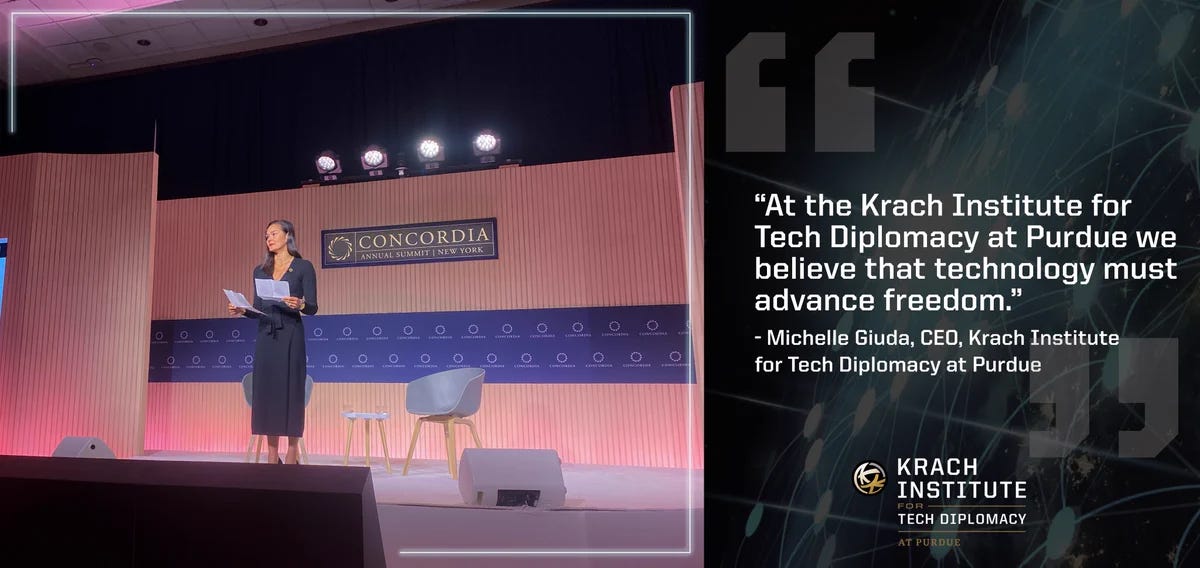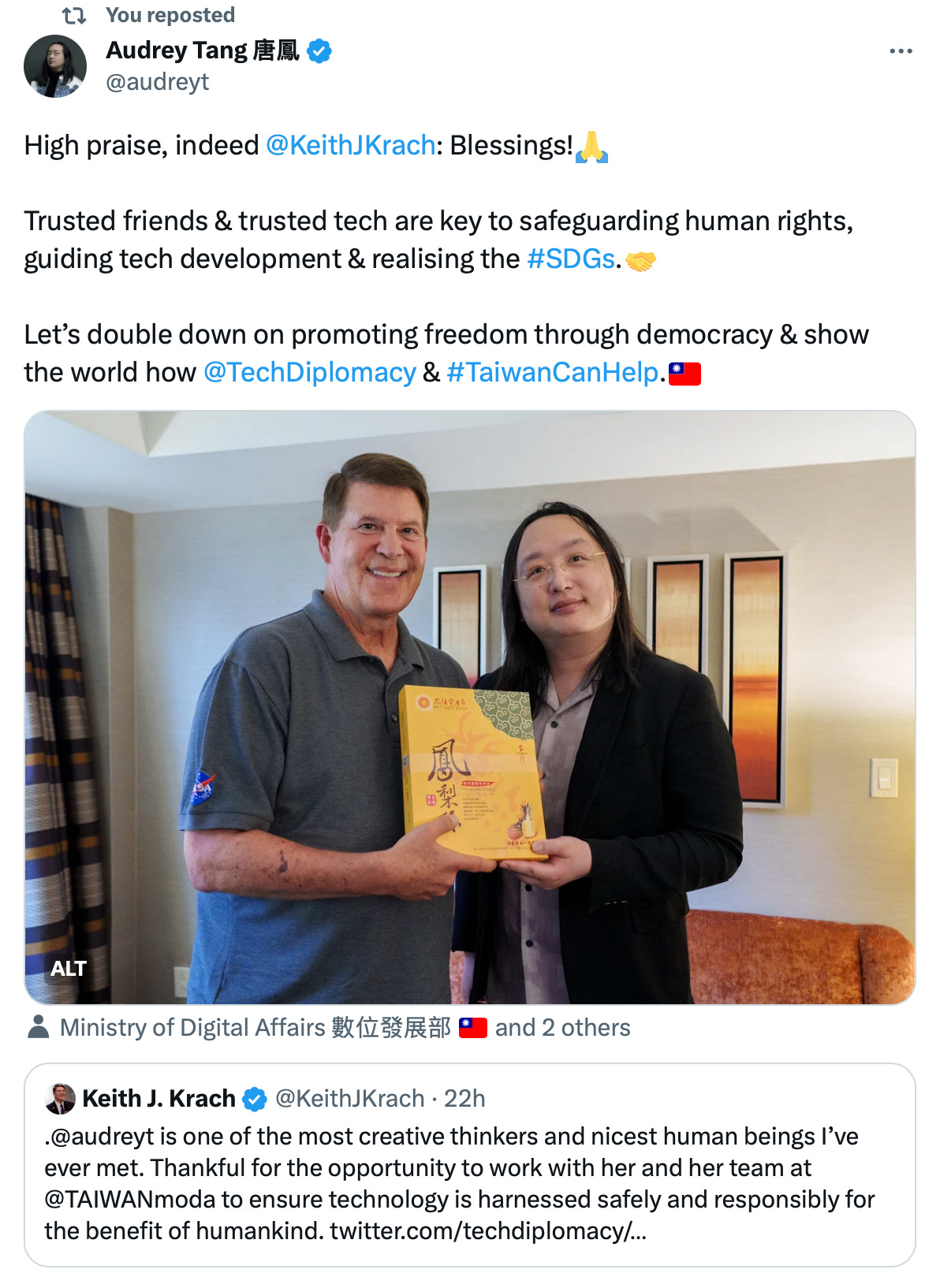Tech Diplomacy Now: The Geopolitics of Satellite Internet
One of the most important lessons coming out of the war in Ukraine is the criticality of the internet to warfighting
TABLE OF CONTENTS
Top News of the Week
Announcements
Latest News
Technology Strategy and Policy
Artificial Intelligence
Telecommunications Networks and Infrastructure
Critical Minerals
Synthetic Biology
Quantum
Advanced Aerospace Technology
Semiconductors and Microelectronics
Energy and Climate
Opinion and Commentary
The Last Word
Top News of the Week – The Geopolitics of Satellite Internet
One of the most important lessons coming out of the war in Ukraine is the criticality of the internet to warfighting. From the employment of air defenses to intelligence and targeting to logistics to information warfare, connectivity to the internet has become absolutely critical.
And while fixed physical infrastructure can and will be targeted, broadband internet connectivity from low-earth orbit satellites offers nearly ubiquitous connectivity given the recent deployment of an overwhelmingly commercial constellation of satellites. Ukraine’s employment of SpaceX’s Starlink satellite internet has revolutionized how frontline troops can get access to intelligence and conduct operations. And efforts by Starlink to limit the company’s involvement in military operations has raise questions with governments as they see critical warfighting functions at the whim of companies that can be coerced.
This has encouraged other countries to explore launching their own constellations and for governments to pay much closer attention to the business models of the commercial providers.
Last week the German Government blocked an attempted take-over of a European low-earth orbit satellite company, Kleo Connect, after a multi-year effort by Beijing to gain control over critical low earth orbit satellite licenses.
More background:
Keeping Taiwan Online – The Wire China, September 17, 2023
Berlin blocks complete takeover of satellite startup by Chinese firm – Reuters, September 13, 2023
China Plans to Build a Satellite Network to Rival Elon Musk’s Starlink – WSJ, July 24, 2023
Taiwan, looking to Ukraine, pursues internet backup – Washington Post, October 6, 2022
The corporate feud over satellites that pitted the west against China – Financial Times, June 22, 2022
Announcements
Keith Krach, Chairman of the Krach Institute for Tech Diplomacy at Purdue, delivered a speech at the Digital X conference in Cologne, Germany encouraging the defense of tech standards, data security, privacy, & reliability.
“As a global CEO, I've always respected Germany’s gold standard for quality, data security, privacy, & reliability.
As an American diplomat with German roots, I’ve come to admire the wisdom in Article 1 of the German Basic Law: ‘Human dignity shall be inviolable. To respect and protect it shall be the duty of all state authority.’
Communist China’s technology perpetuates a surveillance state & enables Uyghur genocide. Tools that even history's worst dictators could only dream of.
Banning Huawei/ZTE would uphold Germany’s commitment to defending human dignity & reinforce its place among the world’s leading democracies.
The 5G decision is up to the people of Germany and we respect it. But we urge Germany to defend these standards, following the example of the EU and NATO.” - Chairman Keith Krach at the Digital X Conference in Cologne, Germany.
While traveling through Germany, Chairman Krach also had a conversation with Handelsblatt regarding the possibility of a Huawei ban.
The German Huawei debate is being followed closely internationally. Former US diplomat Keith Krach, who launched an international initiative for “clean networks” in the government of former President Donald Trump, points out the moral dimension of the 5G debate in the Handelsblatt. “The Chinese Communist Party is using technology to maintain a surveillance state and enable the genocide of the Uyghurs,” said Krach, who now heads a US institute for tech diplomacy. A Huawei ban would “uphold Germany’s commitment to defending human dignity and cement its place among the world’s leading democracies.”
Read the full article HERE.
At the Concordia 2023 Summit earlier this week, Chairman Krach held a discussion with Kersti Kaljulaid, fellow Co-Chair at the Global Tech Security Commission, where their main focus was on the pivotal role of free markets and the advancement of freedom through technology. During the event, Michelle Giuda, CEO of the Krach Institute for Tech Diplomacy, also delivered remarks that emphasized the significance of technology in promoting freedom.
UPCOMING WEBINAR: Please join the Global Tech Security Commission (GTSC) on September 27 at 2:00pm ET for a virtual panel discussion on the how the US and its allies should think about and counter Beijing’s ambitions to modernize its military through Military-Civil Fusion.
China’s defense sector is largely controlled by state-owned enterprises insulated from its commercial economy. However, Beijing has increasingly sought to bolster its military capabilities and modernize the People’s Liberation Army through its civilian sectors.
A key pillar of these efforts, Military-Civil Fusion (MCF) encourages Chinese civilian companies to acquire and pass along to defense firms dual-use technologies from foreign sources rather than developing them indigenously (through both legal and illegal means). MCF has had mixed success and has largely relegated the civilian tech sector as a pass-through entity rather than serving as the source of technology and expertise. Nonetheless, Beijing is likely to continue using MCF to advance its military ambitions, and Washington and its allies must therefore pay close attention to it.
This discussion will examine Beijing’s MCF practices and help shine a light on the extent to which MCF is succeeding. It will also offer insights on how the US and its allies and partners can best counter MCF.
Latest News
Indiana wins $33 million grant for semiconductor hub thanks to Sen. Todd Young's CHIPS Act - IndyStar, September 20, 2023
How China Uses Shipping for Surveillance and Control - Foreign Policy, September 20, 2023
China Sends Record Number of Military Planes Near Taiwan – NYTs, September 18, 2023
Mexico’s Moment: The Biggest US Trading Partner Is No Longer China – Bloomberg, September 12, 2023
The Global Economy Enters an Era of Upheaval – Bloomberg, September 18, 2023
U.S. Helped Pakistan Get IMF Bailout with Secret Arms Deal for Ukraine, Leaked Documents Reveal – The Intercept, September 17, 2023
Technology Strategy and Policy
Summary 2023 Cyber Strategy – U.S. Department of Defense, September 12, 2023
China May Have Unmatched Supercomputer Abilities, Third Exascale Machine Apparently Online – Tom’s Hardware, September 16, 2023
Venture Capital and Supply Chain Vulnerabilities – Office of the Director of National Intelligence, September 13, 2023
America’s Warrior Diplomat, Rahm Emanuel, Takes on China’s Xi Personally – WSJ, September 16, 2023
China’s Apple iPhone Ban Appears to Be Retaliation, US Says – Bloomberg, September 13, 2023
Artificial Intelligence
The global race to set the rules for AI – Financial Times, September 13, 2023
US technologists should help preserve US military and economic leadership – Financial Times, September 14, 2023
Musk Warns Senators About AI Threat, While Gates Says the Technology Could Target World Hunger – WSJ, September 13, 2023
How Rishi Sunak convinced the world to worry about AI – Politico, September 15, 2023
Rishi Sunak considers banning Chinese officials from half of AI summit – The Guardian, September 15, 2023
EU digital chief in Beijing next week for tech, AI talks – Politico, September 14, 2023
Telecommunications Networks and Infrastructure
Huawei and Xiaomi incorporate LLM in smartphones, why not Apple? – DigiTimes Asia, September 13, 2023
China's Huawei says it has reached global patent licensing deal with Xiaomi – Reuters, September 13, 2023
'Redfly' hackers infiltrated power supplier's network for 6 months – Bleeping Computer, September 12, 2023
EU fines TikTok €345mn for breaching children’s data rules – Financial Times, September 18, 2023
Von der Leyen hits China with electric vehicle subsidy probe – Politico, September 13, 2023
Critical Minerals
Indonesia proposes critical minerals trade deal with US – Reuters, September 7, 2023
How China hopes to secure its supply chain for critical minerals – MIT Technology Review, September 13, 2023
India's Modi urges nations with critical minerals to see custodianship as 'global responsibility' – Reuters, August 27, 2023
Synthetic Biology
China seeks to expand police power to collect biological information of suspects in minor offences – SCMP, September 17, 2023
A Rallying Call for Synthetic Biology: Challenges, Opportunities, and Future of the Bioeconomy – SynBioBeta, September 6, 2023
Can Cotton Grown Inside Bioreactors Become a Sustainable Reality In The Future? – SynBioBeta, September 4, 202
Quantum
National Science Foundation invests $38 million in quantum research – FedScoop, August 22, 2023
Researchers Unlock Chip-Based Thermionic Cooling for Quantum Computers, More – Tom’s Hardware, September 17, 2023
Advanced Aerospace Technology
Starlink Surges but Is Still Far Short of SpaceX’s Goals, Documents Show – WSJ, September 13, 2023
Kim Jong Un vows full support for Russia as Putin pledges space tech for North Korea – NPR, September 13, 2023
Semiconductors and Microelectronics
Huawei's Breakthrough, the Technical, Industrial and Strategic Implications – ChinaTalk, September 13, 2023
TSMC tells vendors to delay chip equipment deliveries, sources say – Reuters, September 15, 2023
GlobalFoundries opens $4 bln Singapore chip fabrication plant – Reuters, September 12, 2023
The Flaw in Apple’s Plan to Make Chips in Arizona – The Information, September 11, 2023
Energy and Climate
Electric Shock: Interpreting China’s Electric Vehicle Export Boom – CSIS, September 14, 2023
Europe's Battle Against Chinese EVs Isn't a Repeat of 2000s Solar Flood – Bloomberg, September 18, 2023
EU risks depending on China for batteries after quitting Russian energy – Reuters, September 18, 2023
EU risks trade war with China over electric vehicles – Politico, September 13, 2023
Opinion and Commentary
The Endless Frustration of Chinese Diplomacy – Cindy Yu, Foreign Policy, September 17, 2023
Grand bargain for Bretton Woods – Rabah Arezki, Politico, September 12, 2023
China-Russia cooperation thriving despite headwinds – Mikhail Karpov, Asia Times, September 8, 2023
China’s Tech Industry Shows It Still Means Business – Foreign Policy, September 18, 2023
The Last Word
About: Tech Diplomacy Now
The Krach Institute for Tech Diplomacy at Purdue is the world’s preeminent trusted technology accelerator. As the leader of the new category of Tech Diplomacy, the Institute integrates technology expertise, Silicon Valley strategies, and foreign policy tools to build the Global Trusted Tech Network of governments, companies, organizations and individuals to accelerate the innovation and adoption of trusted technology and ensure technology advances freedom.







